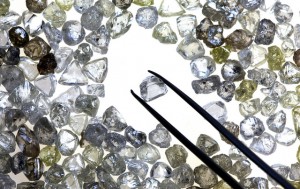By Jim Whitt
He was right. They were there. You couldn’t see them with the naked eye but magnified ten times you could see them — tiny flaws. I was examining a diamond under a loop — the small magnifying glass that jewelers use to examine gems. Looking at the ring from the counter, you would never know the diamonds were anything but perfect.
The jeweler explained how the Gemological Institute of America grades diamonds. In addition to a scale for color and finish, diamonds are examined for inclusions (internal characteristics) and blemishes (external characteristics). This is what determines whether a diamond of approximately the same size is worth as little as $1,000 or as much as $5,000. Only an expert examining the diamond under magnification can determine the difference.
As I viewed the diamond under the loop I could see the inclusions. They were small black flecks that looked like tiny chunks of coal from which the diamond originally evolved. I learned that the reason diamonds come in different sizes and shapes — and contain inclusions and blemishes — is because the cutter wants to preserve as much of the precious stone as possible. There would be no diamond left if the cutter attempted to cut the perfect stone.
In a sense, we view ourselves like a jeweler examining a diamond under a loop. Every flaw is magnified in our own eyes. We look in the mirror and see physical flaws (blemishes). We look inside ourselves and see behavioral flaws (inclusions). As a result we all too often under-appraise our value. Like diamonds we are unique in size, shape, color and finish. Instead of focusing on our flaws we need to understand the cutter wanted to preserve as much of our worth as possible without completely destroying the stone.
How do you see yourself? How would you describe yourself to other people? Would you describe yourself in positive terms or negative terms? Do you think you could be objective about yourself? Would you err on the side of humility or do you think you might tend to be a little vain?
As I’m asking these questions, you’re probably experiencing an internal struggle. On one hand, you don’t want to brag on yourself. On the other, you feel like if you don’t describe yourself in positive terms you may fall victim to a self-fulfilling prophecy. If I describe myself in negative terms, then I might just live down to my expectations. Yet if I describe myself in positive terms people might think I’m egotistical.
If you’re a parent, how do you describe your children to other people? Do you describe them in positive or negative terms? Are you objective about your child’s abilities? Do you err on the side of humility or do you tend to brag a little bit? I’m betting that you tend to describe your child in positive terms. It’s not that you don’t know your children’s shortcomings. You have to live with them every day. But you see the tremendous potential your children possess. And you tend to view them in terms of what they can be rather in terms of what they aren’t. So it’s normal for parents to brag a little bit when it comes to their kids.
Now, how do you think God would describe you? Would he point out your flaws or do you suppose he would describe you in terms of how he created you exactly to the precise specifications required to fulfill your purpose?


